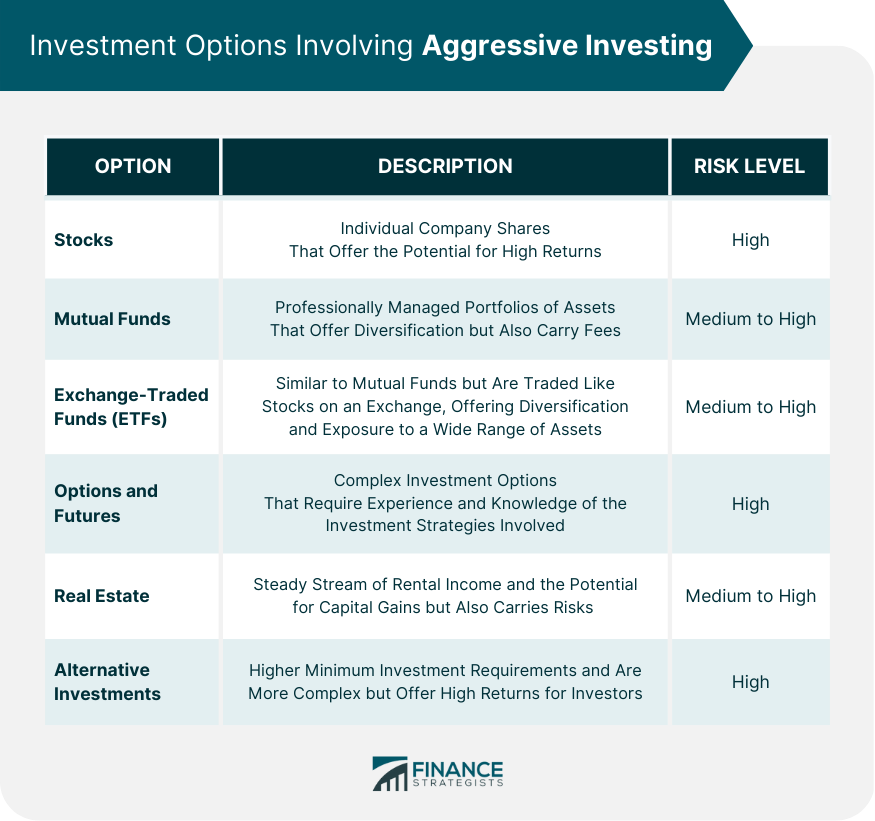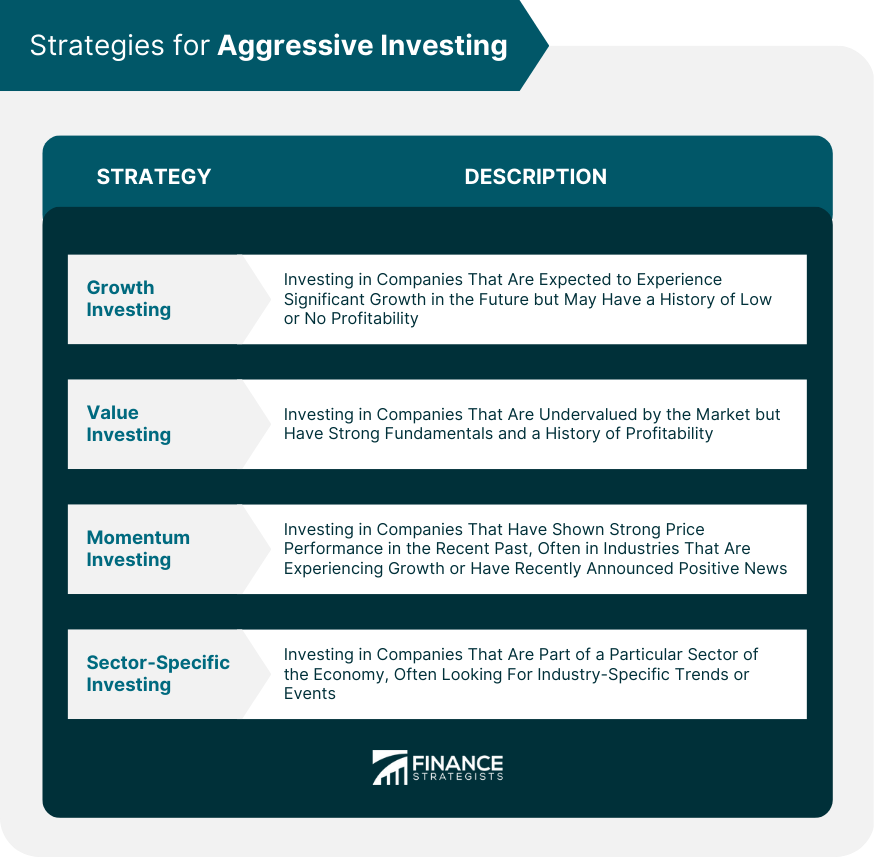Aggressive investing is a term used to describe an investment strategy that carries a high level of risk with the potential for high returns. This type of investing is typically associated with stocks, mutual funds, exchange-traded funds (ETFs), options and futures, real estate, and alternative investments. Aggressive investing is not for everyone. Investors need to have a high tolerance for risk, a long-term investment horizon, and a solid understanding of the investment options and strategies available. Have questions about aggressive Investing? Click here. Aggressive investing is a high-risk, high-reward investment strategy. Investors who choose to engage in this type of investing must understand that the potential for high returns comes with a higher level of risk. The risk of losing money is higher with aggressive investing, but the potential for significant gains is also much higher. For investors with a high-risk tolerance, aggressive investing can be a valuable way to achieve their investment goals. One crucial factor to consider when engaging in aggressive investing is risk tolerance. Risk tolerance refers to an investor's ability to handle market fluctuations, losses, and risk. Investors with a low-risk tolerance may want to consider other investment options with less risk. On the other hand, investors who have a higher risk tolerance may be more comfortable taking on more risk to achieve higher returns. Many investment options are available for aggressive investors, including stocks, mutual funds, ETFs, options and futures, real estate, and alternative investments. Each investment option has its unique risks and potential rewards. Stocks are a popular choice for aggressive investors because they have the potential for high returns. However, stocks are also volatile and carry a high level of risk. Investors who choose to invest in stocks should be prepared for the possibility of significant losses and gains. Mutual funds are another option for aggressive investors. Mutual funds are professionally managed investment portfolios that invest in various stocks, bonds, and other assets. Mutual funds offer diversification and can expose investors to a wide range of assets. However, mutual funds also carry fees, and investors may not have direct control over the investments in the portfolio. ETFs are similar to mutual funds in that they are professionally managed portfolios of assets. However, ETFs are traded like stocks on an exchange so investors can buy and sell shares throughout the trading day. ETFs offer diversification and can expose investors to a wide range of assets, but they also carry fees and may be subject to market volatility. Options and futures are more complex investment options experienced investors often use. These investments can provide high returns, but they also carry a high level of risk. Investors who choose to invest in options and futures should be prepared to lose money and understand the investment strategies involved. Real estate is another investment option for aggressive investors. Real estate can provide investors with a steady stream of rental income and the potential for capital gains. However, real estate carries risks like vacancies, property damage, and unexpected expenses. Alternative investments, such as private equity, hedge funds, and commodities, are also options for aggressive investors. These investments often have higher minimum investment requirements and are more complex than traditional investments. However, they can also provide high returns for investors who are willing to take on the additional risk. There are several strategies that investors can use when engaging in aggressive investing. Some of the most popular strategies include growth, value, momentum, and sector-specific investing. Growth investing involves investing in companies that are expected to experience significant growth in the future. These companies often have high price-to-earnings ratios and may not have a history of profitability, but they have the potential for high returns if they succeed. Value investing involves investing in companies that are undervalued by the market. These companies may have lower price-to-earnings ratios or other indicators of undervaluation. Investors who engage in value investing often look for companies with strong fundamentals and a history of profitability. Momentum investing involves investing in companies that have shown strong price performance in the recent past. These companies are often in industries that are experiencing growth or have recently announced positive news. Momentum investors may also look for companies with high trading volumes or other indicators of market interest. Sector-specific investing involves investing in companies that are part of a particular sector of the economy. This strategy may involve investing in companies expected to benefit from industry-specific trends or events. For example, investors may choose to invest in companies in the technology or healthcare sectors. Investors who choose to engage in aggressive investing should consider several factors when making investment decisions. One important consideration is the time horizon. Aggressive investing is often a long-term strategy, and investors should be prepared to hold their investments for several years or even decades. This allows for the potential for significant gains over time, but it also requires patience and a willingness to weather market fluctuations. Diversification is also an essential consideration for aggressive investors. Diversification means spreading investments across various assets and industries to reduce the portfolio's overall risk. By diversifying investments, investors can minimize the impact of losses in any one particular asset or industry. This can help to protect the overall value of the portfolio over time. Monitoring investments is also important for aggressive investors. Market conditions and industry trends can change rapidly, and investors should be prepared to adjust their investments as needed. This may involve selling assets that are underperforming or investing in new opportunities that arise. Finally, tax implications are an important consideration for aggressive investors. Certain investments may carry tax advantages or disadvantages, and investors should be aware of these implications when making investment decisions. Working with a financial advisor can help investors to navigate these complexities and make informed investment decisions. Aggressive investing is a high-risk, high-reward investment strategy that requires a high tolerance for risk, a long-term investment horizon, and a solid understanding of investment options and strategies. Investors engaging in aggressive investing should consider risk tolerance, diversification, monitoring investments, and tax implications carefully. By doing this, they can make informed investment decisions. Aggressive investing can be a valuable strategy for achieving high returns over time, but it also carries a high level of risk. Consulting with a wealth management specialist is recommended to navigate these complexities and build a successful investment portfolio.What Is Aggressive Investing?
Risks and Rewards of Aggressive Investing
Investment Options Involving Aggressive Investing
Stocks
Mutual Funds
ETFs
Options and Futures
Real Estate
Alternative Investments

Strategies for Aggressive Investing
Growth Investing
Value Investing
Momentum Investing
Sector-Specific Investing

Considerations for Aggressive Investing
Time Horizon
Diversification
Monitoring Investments
Tax Implications
Conclusion
Aggressive Investing FAQs
Aggressive investing is a high-risk, high-reward investment strategy that involves investing in high-risk assets with the potential for significant returns.
Some investment options for aggressive investors include stocks, mutual funds, ETFs, options and futures, real estate, and alternative investments.
Investors should consider factors such as risk tolerance, time horizon, diversification, monitoring investments, and tax implications before engaging in aggressive investing.
Some popular strategies for aggressive investing include growth investing, value investing, momentum investing, and sector-specific investing.
It is recommended to hire a financial advisor if you want to engage in aggressive investing. A financial advisor can provide personalized advice and help investors make informed decisions that align with their investment goals and risk tolerance.
True Tamplin is a published author, public speaker, CEO of UpDigital, and founder of Finance Strategists.
True is a Certified Educator in Personal Finance (CEPF®), author of The Handy Financial Ratios Guide, a member of the Society for Advancing Business Editing and Writing, contributes to his financial education site, Finance Strategists, and has spoken to various financial communities such as the CFA Institute, as well as university students like his Alma mater, Biola University, where he received a bachelor of science in business and data analytics.
To learn more about True, visit his personal website or view his author profiles on Amazon, Nasdaq and Forbes.











